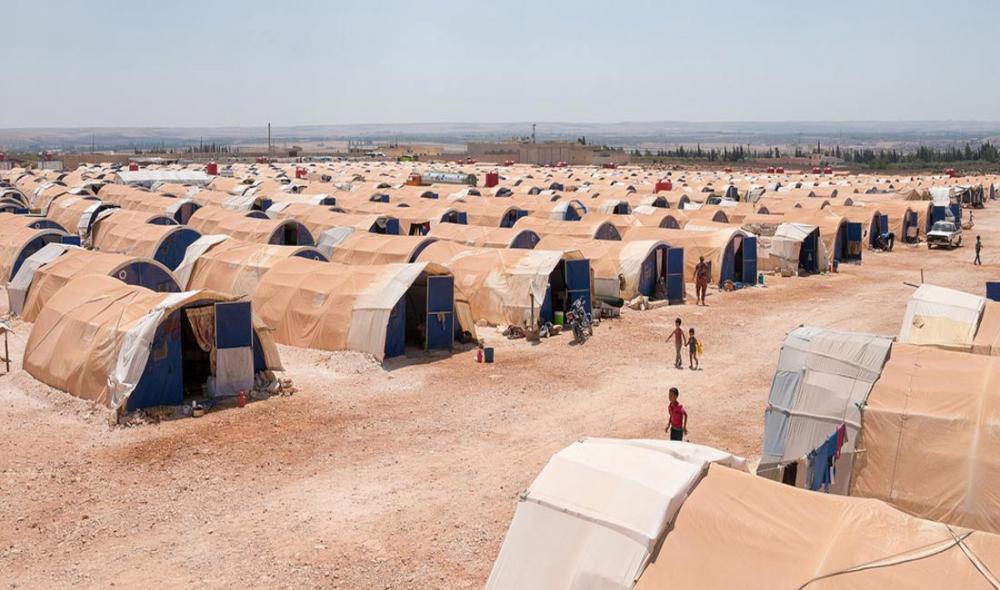Just Earth News | @JustEarthNews | 13 Sep 2018

UNHCR/Antwan Chnkdji
New York,All parties to the seven-year Syria conflict and the States that support them should do “everything in their power” to prevent a full-scale military assault on Idlib, a high-level United Nations-appointed panel of investigators said on Wednesday.
All the other disasters would be minor events compared to what can happen in Idlib,” said Paulo Pinheiro, chair of the Commission of Inquiry on the Syrian Arab Republic.
At a press conference in Geneva, to discuss the panel’s latest findings on rights violations committed in Syria, Pinheiro called on “all parties to the conflict and those estates who support them, to do everything in their power to prevent a massacre in Idlib”.
The development comes amid growing international calls for a de-escalation of violence in and around the north-west region, which is home to nearly three million people. They are some of the victims of an “unprecedented” level of internal displacement across Syria, according to the report.
On Tuesday, UN Secretary-General António Guterres urged those involved in the more than seven-year war to avoid a further escalation, warning that failure to do so would unleash “a humanitarian nightmare unlike any seen in the blood-soaked Syrian conflict” so far.
The UN chief also underscored that while the presence of terrorist groups sheltering in Idlib could not be tolerated, fighting terrorism “does not absolve warring parties of their core obligations under international law”.
Some 10,000 fighters that have been identified as terrorists by the UN are believed to be living in Idlib, in among 2.9 million civilians, Mr. Pinheiro said. The protection of civilians was paramount, he insisted:
“Of course, you don’t have anything against fighting against terrorists, but something has to be done to protect the rights of three million people and one million children. I think that this is something that has to move the powers involved in this decision.”
Unprecedented levels of civilian displacement
The latest Commission of Inquiry report is its 16th update on the conflict, as mandated by the Human Rights Council in August 2011.
It details how in under six months this year, as pro-Government forces moved to recapture large swathes of territory, more than one million Syrian men, women, and children were displaced in six key battles.
Most now face dire living conditions, Hanny Megally, Member of the Commission of Inquiry, told journalists in Geneva.
“Many of them are living in tents,” he said. “Many of them are living in destroyed property…So any further deterioration of their living situations is of great concern.”
Most battles were marked by war crimes by all belligerents, it says, including launching indiscriminate attacks, deliberately attacking protected objects, using prohibited weapons, pillaging and/or forced displacement.The panel’s 24-page report highlights intense fighting between January and June in Aleppo, northern Homs, Damascus, Rif Damascus, Dara’a, and Idlib governorates.
In other instances, parties to the conflict failed to take all feasible precautions to protect civilians, as required by international humanitarian law.
Noting the “extremely high cost” to civilians of the battle to regain territory, Megally said that some areas including Yarmouk camp in Damascus and parts of eastern Ghouta had been so heavily destroyed “that there is no foreseeable possibility of civilian return”.
The panel’s findings also detail alleged chemical weapons attacks by Government forces in heavily populated areas of Douma, eastern Ghouta, earlier this year. “Witnesses consistently recalled the distinctive smell of chlorine at the affected sites and on victims’ clothing,” the report reads.
On the munitions allegedly used in the Douma attacks, the report indicates that “material evidence…indicated a type known to have been used only by Government forces or, rarely by militias”.
“What we’ve identified is rockets that were manufactured in Iran, that have been adapted in Syria and have been adapted in a way that they could be used, it seems, to then be filled up with chlorine and used in some of these chlorine attacks,” Megally said.